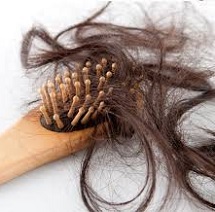![]()
 Although hair loss is more common in men than women, people of both genders can experience problems with thinning hair. It is important to say that there are a number of different causes of hair loss ranging from hormones to nutrition.
Although hair loss is more common in men than women, people of both genders can experience problems with thinning hair. It is important to say that there are a number of different causes of hair loss ranging from hormones to nutrition.
If you are experiencing hair loss, here are some of the most common causes that you may want to consider:
1. Male Pattern Baldness. Nearly two-thirds of all men experience hair loss by the time they reach age 60. This hair loss follows a typical pattern, with the hairline receding at the temples. There also may be some thinning at the crown. This type of hair loss typically is due to a combination of genetics and male sex hormones.
2. Extreme stress. When your body undergoes extreme stress, it can interrupt the natural growing cycle of your hair, causing it to prematurely enter the shedding phase of the cycle. As a result, you may experience thinning hair anywhere from about three to six months after the stress. Fortunately, this type of hair loss is not permanent. Once your body has a chance to recover from the stress, your hair should start growing back again.
3. Hypothyroidism. Having an underactive thyroid can contribute to hair loss. If you are losing hair and also have signs of hypothyroidism, you should visit your doctor for a blood test to determine whether or not your thyroid is functioning correctly. If you do have hypothyroidism, you should be able to correct the problem with medication. Once your hormone levels get back where they should be, your hair should start growing normally again.
4. Aging. Thinning hair is a natural part of aging for both men and women. Unfortunately, doctors don’t really know why it happens. There aren’t any treatments available that can help counteract this problem. As a result, most people who suffer from thinning hair as they get older turn to cosmetic fixes such as choosing a hairstyle that hides any thin spots or wearing wigs or hairpieces.
5. Medication. Certain types of medication may cause hair loss. Read through a list of side effects for any medication that you are currently taking to see if thinning hair is listed as a side effect. Alternatively, you can also ask your doctor if your medication could be contributing to your hair falling out. If so, you may be able to find an alternative to your current medication that does not affect your hair.
6. Pregnancy. When a woman becomes pregnant, her body undergoes a number of hormonal changes. These changes can sometimes result in hair loss. Some women find that their hair looks better than ever while they are pregnant, but then starts thinning after they give birth. The hair loss may also be caused by the stress of giving birth. Either way, rest assured that your hair should grow back within a few months. If it doesn’t, talk to your doctor about whether or not you may have a hormonal imbalance or some other underlying issue contributing to your thinning hair.
7. Anemia. Anemia is extremely common among women who are still menstruating. Iron deficiency anemia can contribute to hair loss. If you notice thinning hair and are also feeling fatigued, you should consider a blood test to rule out anemia. This condition is easily treatable. Once reversed, your hair should start growing like normal again.
8. Inadequate Protein Intake. If you are vegetarian or if you simply don’t get a lot of protein in your diet, you may notice that your hair starts thinning. This is because your body is using the little bit of protein that you are getting for more vital functions and doesn’t have enough left over to put into growing hair. Even if you don’t eat meat, there are still quite a few different ways that you can ensure that your body is getting enough protein. Consider talking to a dietitian to develop an eating plan that meets all of your nutritional needs.
These are some of the most common causes of hair loss. If you are experiencing unexplained hair loss, a trip to your doctor is usually in order. There are a number of underlying medical conditions that could be causing your hair to thin.




 OneCareNow is a general weblog that was created by several writers with a specific goal in mind: To offer one place that covers important topics which people really care about.
OneCareNow is a general weblog that was created by several writers with a specific goal in mind: To offer one place that covers important topics which people really care about.



![Back Pain Breakthrough by Palmer & Dr. Young [2024 Review]](https://www.onecarenow.org/wp-content/uploads/2021/02/Back-Pain-Breakthrough-Young-Amy-50x50.png)
![Vincent’s Midas Manifestation System Review [Updated 2024]](https://www.onecarenow.org/wp-content/uploads/2021/02/Midas-Manifestation-50x50.png)
![The NEW Happiness Code by David [Updated 2024 Review]](https://www.onecarenow.org/wp-content/uploads/2021/01/The-NEW-Happiness-Code-50x50.png)
![Michael Christianson’s Manifestation Sigil Review [2024]](https://www.onecarenow.org/wp-content/uploads/2021/01/Manifestation-Sigil-50x50.png)
